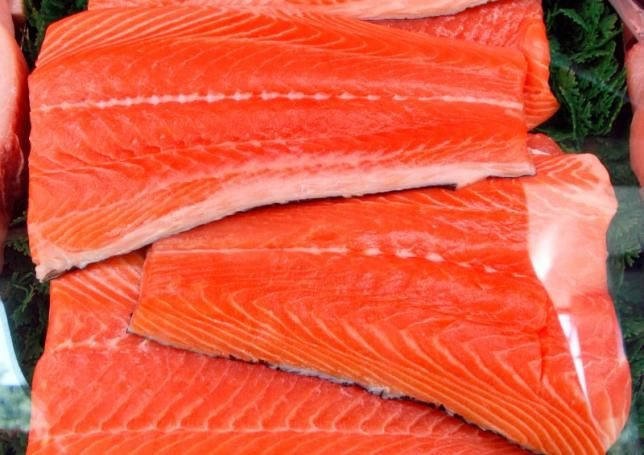Genetically Modified Salmon Cleared For Human Consumption

Federal regulators cleared the way for a genetically engineered salmon to be farmed for human consumption in the first-ever such approval for an animal whose DNA has been scientifically modified. The U.S. Food and Drug Administration's approval of the salmon, developed by AquaBounty Technologies to grow faster than conventional, farmed salmon, followed years of deliberations. The regulator has now declared that the salmon is as nutritious as normally grown Atlantic salmon, which means the salmon will not require special labeling.
AquaBounty is majority-owned by Intrexon Corp, whose shares were up 6.4 percent at $37.55 in early afternoon trading.
Several genetics experts voiced support for the FDA's action, but some groups opposed to genetically modified foods expressed concern.
AquaBounty Chief Executive Officer Ronald Stotish said the approval is "a game-changer that brings healthy and nutritious food to consumers in an environmentally responsible manner without damaging the ocean and other marine habitats."
The approval for the fish, to be sold under the AquAdvantage brand, comes with the condition that the salmon be raised only in two specific land-based, contained hatchery tanks in Canada and Panama, and not in the United States.
Dr. William Muir, a professor of genetics at Purdue University, called the announcement "a huge win-win for the environment, consumers, and the process."
Muir said there is "no credible evidence" that these genetically modified fish are a risk to either human health or the environment. "In contrast, the current practice of using wild caught salmon as a food source is not sustainable, our oceans are over-fished," Muir said.
Muir's comments were echoed by a 2014 letter sent to President Barack Obama signed by 80 scientists and biotech industry executives asking for administration support for this approval.
Consumer and environmental groups have been working to get retailers to pledge that they will not sell GMO salmon in their stores. Patty Lovera, assistant director for Food & Water Watch, which opposes GMO salmon, said the group is talking to members of Congress to see if they will roll back the FDA approval. Lovera also said the group is considering a lawsuit to block GMO salmon from reaching the market.
According to the activist group Friends of the Earth, at least 35 other species of genetically engineered fish, along with chickens, pigs and cows, are under development, and the FDA’s decision on this genetically engineered salmon application sets a precedent for other genetically engineered fish and animals.
FDA officials in a conference call would not comment on whether or how many applications the agency has received for other genetically modified animals, but said the agency considers all applications on a case-by-case basis.
The agency on Thursday also issued draft guidelines on the voluntary labeling of genetically modified foods.
Dr. Eric Hallerman, professor of fish conservation at Virginia Tech University, said the approval is significant because it marks the first approval globally for production of genetically modified animals for food production and sale.
"While studies have shown that salmon products derived from the AquAdvantage salmon are no different from those derived from conventional production, some consumers have argued for a 'right to know' how food products were produced," Hallerman said.
© Copyright Thomson Reuters 2024. All rights reserved.



















